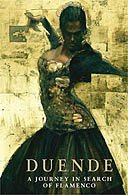Pondering Elsie Bertram's reaction to porn
Also in today's blog
Three very different books
Do you understand duende?
The Dalai Lama on happiness
New-to-me crime writer
Replying to Adrian Weston's comment
I wonder how Elsie Bertram would have reacted to a letter Horace Bent, The Bookseller commentator, published in Bent's Notes on 25 November?
Elsie Bertram MBE, for those who have not heard of her, revolutionised book distribution in the UK and for 40 years was one of the book world's most colourful personalities. She died just over two years ago, at the age of 91.
The letter which made me ponder her reaction was signed "Grumpy Bookseller, The Torbay Bookshop, Paignton" and I have the writer's permission to quote it here.
"Dear Horace - How pleased we were to be offered free personalised Christmas catalogues from Bertrams. We passed them on to our local grammar school, which we supply.
Oh, how they laughed - what joy it put on the little darlings' faces to read on page 30 that they could purchase a book called The Big Book of Porn and "learn how to make a porn film for themselves". To further enhance our reputation as a quality store, on page 22 we were able to promote Bullshit Bingo and, of course, Is It Just Me Or Is Everthing Shit? How apt, and relevant to the choice made by the selection committee of this wholesaler.
Yes, I know I should have checked before handing the catalogue over, so of course it is all my fault. And at least it separates us from the chains. But next year Bertrams might warn us booksellers what market their catalogue is aimed at. Perhaps the one that can read might be useful."

In the same issue of The Bookseller there is a photograph of Matthew and Sarah Clarke, the owners of The Torbay Bookshop, at the English Riviera Awards ceremony at which they received the Best Retailer Award. [Photo by courtesy of Torbay Herald Express] At the shop's site I read
The Torbay Bookshop was opened by Sir Patrick Moore on 22nd November 1993. The owners, Matthew and Sarah Clarke, had previously spent their working life in publishing and have been able to use this experience and their numerous contacts to attract many celebrities to their store for signing sessions. In March 2002 Dick Francis opened their stunning new shop…This year sees the successful launch of an out of print book ordering service. Give it a try..so far 96% of the books requested have been found!
Apparently Elsie Bertram was not a great reader. In an interview, she claimed to have forgotten the title of a book of short stories she had enjoyed years before. To her a book was primarily a "product" requiring efficient distribution.
So perhaps she wouldn't have been scandalised by the inclusion of The Big Book of Porn in the catalogue. But my guess is that she would.
Three very different books
On Tuesday I borrowed three books from the nearest used book "library": two non-fiction and a crime novel.

I was surprised to find the hardback of Duende - A Journey in Search of Flamenco by Jason Webster on the shelves.
Webster was born near San Francisco and later moved to Europe as a child, living in England and Germany. He eventually ended up in Alexandria, Egypt, and then Spain, where he learned flamenco guitar and where he has been based on and off for the past ten years. He currently lives in Valencia, Spain, with the flamenco dancer Salud. I searched for a photograph of Salud but couldn't find one.

Asked by
an interviewer what he liked about Spain, he replied
"There are so many things. The Spanish - at least on the Mediterranean where I am - have mastered the art making of making everyday life as generally pleasant as possible. The weather is good, the food is fresh, people smile, shopkeepers chat to you. Friendliness is pretty much the default setting in most ordinary interractions. Perhaps what attracts me most is the deeply human side to the Spanish, though. I have this strong image in my mind of the recent state funeral for the victims of the Madrid train bombings: the King and Queen were weeping alongside the families of the dead. There was neither hysteria nor stiff upper lip, simply a genuine expression of the deep sadness of the occasion. It was very moving, and very Spanish, somehow."
New, Duende cost £12.99. I paid four euros for it, about £2.80. If I take it back there will be a two euro refund. But I may not. If, feeling a moral obligation to reward the author for the pleasure his book gives me, I send him a couple of pounds, it will probably be more than he received on each hardback sold at retail.
The jacket of Duende is taken from a painting called Flamenco Gold by Fletcher Sibthorp who specialises in portraits of Spanish dancers
"Since graduating with an honours degree from Kingston University, Fletcher's career has flourished with commissions for major artworks from such prestigious companies as BP, British Airways, British Telecom and Sony Records…Since 1992, Fletcher's work has been widely exhibited and most of his one-man shows are now held overseas in countries such as Japan and Hong Kong where many of his major works achieve prices of £5,000 and above. More recently, in March 2005, Fletcher held his first major UK exhibition in Mayfair, London. Recieving much acclaim from his vast collection and presentation of his major works through the 3 stages of development - charcoal sketch - colour study and final painting. Sales of his original works reached a staggering £13,000!"
It would be interesting to know what Doubleday paid him to use the painting for Duende's jacket.
The Dalai Lama on Happiness
 The Art of Happiness, a Handbook for Living by His Holiness the Dalai Lama and Howard C. Cutler caught my eye. Having skimmed it, I agree with the Amazon.com reviewer who wrote
The Art of Happiness, a Handbook for Living by His Holiness the Dalai Lama and Howard C. Cutler caught my eye. Having skimmed it, I agree with the Amazon.com reviewer who wrote"…big disappointment here is that there is very little Dalai Lama in this book. It is not the Lama's handbook for living, it is Howard Cutler's handbook for getting rich off the Dalai Lama's good name. Howard Cutler is a professional psychologist, and -- one quickly concludes -- a rather average one."
New-to-me crime writer
Reading the opening pages of a book by an unknown author is like meeting a stranger at a party and being charmed or turned off by their handshake, the way they dress or do their hair, or their laugh.

Half way down page 2 of Alison Taylor's The House of Women, I read
"Her whole body shivered gently and Janet thought she must be of the same age as her own mother, marooned in that sterile time between biological redundancy and death."
Janet is Detective Constable Evans of the Bangor police force and the story opens with "Her irritation increasing by the mile" because of difficulty in finding the house to which she has been called by a doctor who has been visiting a patient - who died a couple of hours earlier - of one of his colleagues who is on holiday.
By page 3, instead of being curious to know what had caused the man's death, I was feeling annoyed by DC Evans', or perhaps the author's, view that women who are no longer fertile are marooned in a sterile time from which only death will release them.
If DC Evans is easily irritated and doesn't get on with her mother, do I want to pursue the
acquaintance?
On the other hand, A Sunday Telegraph review quoted on the flyleaf says
"With her third novel, The House of Women, Alison Taylor confirms her place among the new stars of British crimewriting. A far from straightforward investigation into a suspicious death reveals a history of obsession and long-held hatred, with an intriguing cast of characters, which again includes the compassionate and personable DCI Michael McKenna."
So perhaps I'll press on and see how I like McKenna. Ms Taylor doesn't appear to be a member of the Crime Writers' Association and has no website, but I found some info about her in the author directory at Tangled Web UK where she's listed as Alison G Taylor and her bio reads
"Alison Taylor never intended to be a crime writer. In 1986 she was working as a senior social worker for the former Gwynedd County Council. Increasingly disturbed by reports of the alleged abuse of children in care, she took her concerns to the police. As a result she was fired. What her actions have helped to expose is one of Britain's worst scandals of institutionalised physical and sexual abuse in children's homes in North Wales. Because of the extent and nature of the allegations, in 1996 the government took the rare step of ordering a Tribunal of Inquiry, which began hearing evidence in January 1997, and is due to report this year. Alison Taylor won two national awards for her selfless work in this area; the first Community Care Readers Award, and the Campaign for Freedom of Information Award in 1996. Disillusioned by the prospect of returning to social work, Alison concentrated on writing. Her first novel…won her outstanding critical acclaim and comparisons to PD James and Ruth Rendell…. A television series featuring Superintendent Michael McKenna is currently under negotiation."
Replying to Adrian Weston's comment
In a comment on my 20 November blog, Adrian Weston wrote
"Anne, I'm sorry but I agree with Stephen on this - good graphic novels can be astounding: Maus is one and Raymond Briggs' recent one about his parents reduced me to tears. Bad ones, needless to say, are awful - but that's true of every literary form. I think graphic novels just draw on a different sensibility and have a visual vocabulary to work with.
I do, however, agree with you about the diminished quality of the popular novel. What I'm curious to know is when the shift occurred - my suspicion is in the 70's as a transition point between the dying days of the Rumer Godden/Mary Stewart type writer and the rise of the Jeffrey Archer vileness. But, I'd be curious to know what you think."
Adrian, I'll read RB's book at the first opportunity. Incidentally, I have no problem with readers disagreeing with my views. My formative years were spent in the reporters' rooms of several provincial newspapers and, in those pre-PC days, vigorous arguments on all kinds of subjects were the norm. Desks were thumped, voices were raised as topics were thrashed out.
But however blue the air may have been when I was out of the office, in those days men had the ability to censor their language whenever women were present. The only time I heard "bad" words was when covering the magistrates' and juvenile courts. Sometimes policemen, looking embarrassed if there was a woman on the bench or among the reporters, would read out abusive remarks made by the person in the dock.
Nowadays, even one of my favourite bloggers, Grumpy Old Bookman, occasionally uses words in his blog which I doubt if he uses in conversation with his wife.
Re your second para, I'm not sure when and why the rot set in with the popular novel. I suspect one of the causes is authors being advised what to write by publishing people and being afraid to say, "But I don't want to write that…I want to write this."
More on this interesting and important subject next Sunday.

7 Comments:
Anne, I'm another fan of Raymond Briggs, starting with his wonderful children books. The first I saw was The Snowman, long before it became an icon of Christmas. No words, just pictures; it works like a silent movie.
And When the Wind Blows, is a Cold War classic.
qzz0619
prada sunglasses
pandora outlet
true religion outlet
harden shoes
ferragamo outlet
polo ralph lauren
soccer jerseys
fitflops sale clearance
clarks shoes
prada handbags
www0710
polo shirts
canada goose outlet
canada goose outlet
hawks jerseys
coach outlet
cartier jewelry
denver broncos jerseys
pandora outlet
michael kors
air jordan shoes
coach outlet
pandora charms outlet
golden goose
adidas superstars
nhl jerseys wholesale
coach outlet
christian louboutin sale
golden goose sneakers
moncler online outlet
coach outlet online
nike sneakers for women
michael kors handbags
kobe shoes
goyard
yeezy boost 350
kobe shoes
golden goose outlet
golden goose
goyard handbags
adidas zx flux
yeezy boost 350
yeezy 500 blush
huarache shoes
off white jordan 1
nmd
hogan outlet online
kd 11 shoes
golden goose
ferragamo sale
yeezy shoes
off white shoes
kd shoes
off white
kyrie 7
moncler
kyrie 5 shoes
supreme clothing
jordan shoes
kyrie 6 shoes
goyard bags
Post a Comment
<< Home